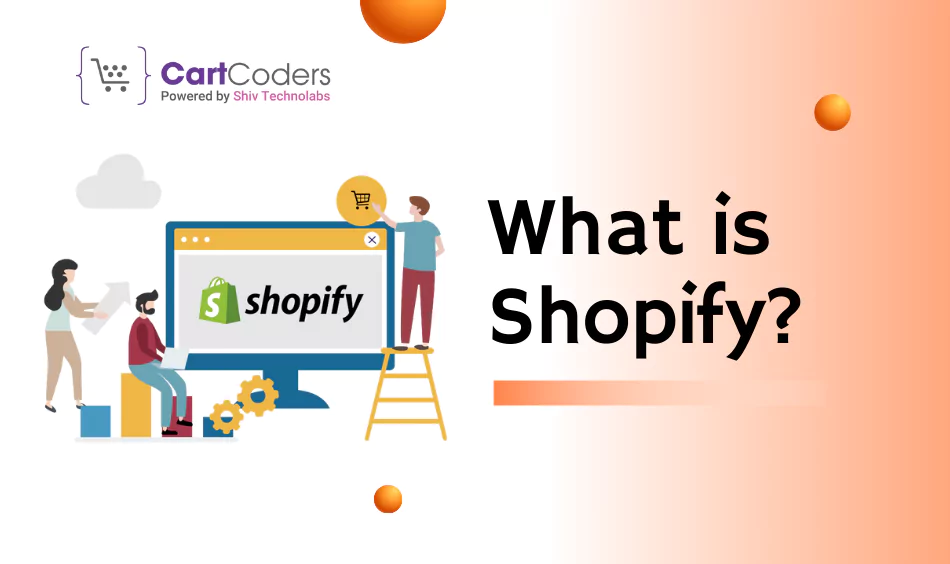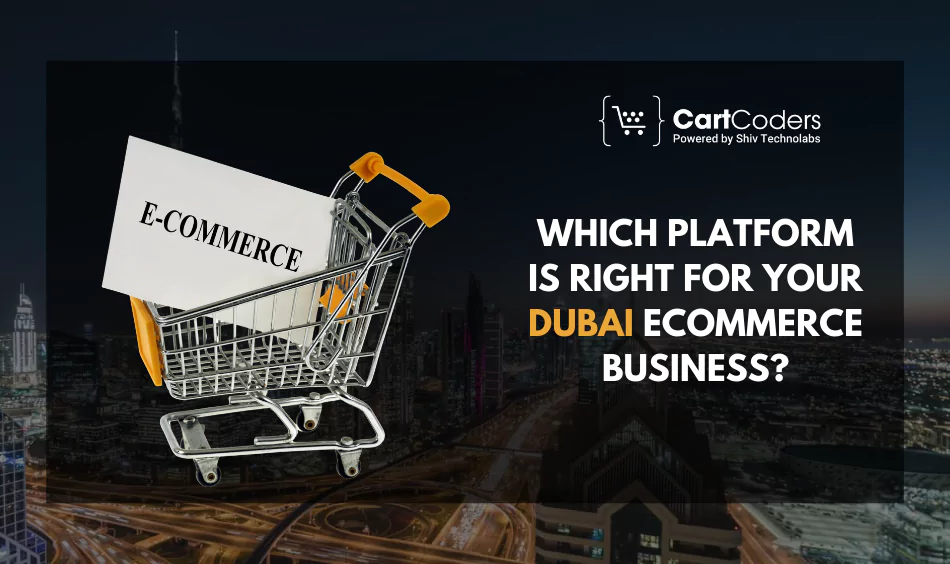Custom Engagement Solutions
Unlock tailored solutions with a free, no-obligation strategy session.
Expert Developers & Engineers on Demand
Scale Your Team with Skilled IT Professionals
Expert Guidance for Digital Transformation

Dubai eCommerce market is touching heights, with more and more people turning to online shopping, rising digital literacy, and a government that embraces online commercial enterprise models.
Today, more than 80% are counting on online shopping in Dubai and globally. If we see the latest statistics, the UAE’s eCommerce market is expected to cross $17 billion by 2025. But without choosing the right platform, you are missing out on a significant portion of your revenue. Shopify and Magento, a Dubai eCommerce platform, is a great battle of the best e-commerce platforms to develop your online store.
Shopify is a few steps ahead of Magento when it comes to scaling your store and listing products while ensuring a smooth interface.
Here, we will help you figure out which platform aligns better with your business ambitions
Magento(Adobe Commerce) is an open-source eCommerce platform regarded as the extensive choice for online store owners to get hands-on flexibility, customization, and scalability. Owned by Adobe, Magento is used by businesses and online shops that need full control over the website architecture, backend workflows, and user experience.
Adobe Commerce is particularly well-suited for massive product catalogs, multilingual sites, and custom integrations. Brands that require tailor-made logic, superior B2B features, or multi-store environments regularly flip to Magento.
Key Features

Shopify is an eCommerce platform designed to transform your online store. Designed for ease of use, fast deployment, and smooth operation. It allows businesses to launch, manage, and expand online stores without the need for extensive development work. Whether you want to list limited products or nearly 1000 products, Shopify delivers smooth performance.
Shopify is favored among Dubai startups, SMEs, and DTC brands that favor moving fast, holding costs predictable, and focusing on marketing and growth. It comes with built-in hosting, security, mobile-optimized themes, and an extensive app ecosystem.
For more complex setups, Shopify Plus (its agency offering) allows customisation of checkout, automation, and multi-market control, making it suitable for scaling UAE brands.
Key Features of Shopify
Struggling to choose between Magento and Shopify, which is better? No more struggle; here we have put together end-to-end differences between Magento and Shopify in Dubai. Keep reading to know the Magento vs Shopify comparison for Dubai retailers:
Magento’s setup is developer-intensive. It offers strong abilities, however requires technical information to install, configure, and maintain. Custom themes, modules, and integration with third-party structures commonly demand a full-stack improvement team or long-term agency partnership.
Shopify’s setup is plug-and-play. Most aspects are built in, and extra features can be brought via apps. Custom improvement is minimal until you’re using Shopify Plus.
Use case:
Dubai’s diverse population and bilingual consumer base (English + Arabic) make multilingual functionality a non-negotiable requirement.
Magento helps RTL (Right-to-Left) and multilingual storefronts natively. You can create language-specific websites, control regional content, and localize tax and foreign money good judgment per country—all out of the box.
Shopify, by contrast, requires third-party apps or Shopify Markets to allow multilingual storefronts. RTL aid (Arabic) also desires customization or plugins.
For Dubai-based businesses targeting Arabic- and English-speaking customers, Magento provides greater native support. However, Shopify Plus can bridge the gap with delivered flexibility.
Both platforms:
Magento developers can configure any UAE charge gateway like Network International, MashreqPay, PayFort, or PayTabs. Shipping integrations (Aramex, Fetchr, etc.) require custom modules or third-party plugins.
Shopify seamlessly integrates with the main local gateways: PayTabs, Telr, and Checkout.com, provide direct aid for UAE transport providers via apps.
Shopify Plus affords greater customization at checkout, localized promotions, and automation capabilities, making it perfect for manufacturers with excessive transaction volumes or regional campaigns.
Shopify’s growing partner network in the UAE makes integrations quicker and more reliable.
Magento provides complete control over on-page SEO, meta tags, structured data, and URL structures. However, accomplishing the most useful overall performance requires guide optimization, CDN integration, and server-side tweaks.
Shopify is optimized for mobile speed by default, especially on its free themes. It affords strong SEO out of the box, with restrained control over certain technical factors like URL structures.
In terms of marketing:
Shopify provides native e-mail automation, discount engines, and thousands of advertising apps (Klaviyo, Omnisend, etc.)
Magento has superior judgment for promotions; however, it requires developer assistance or custom workflows.
Shopify’s app market is more substantial and plug-and-play for marketing needs.
Verdict:
Let’s break it down:
| Cost factors | Magento | Shopify |
| Development cost | $5000-$50,000 (custom build) | $1500-$10,000+ (themes + apps) |
| Hosting | $30-$300+ (cloud or dedicated) | Included in all Shopify plans |
| Maintenance | Ongoing dev support required | Mostly self managed |
| Add ons & plugins | Custom modules or paid extension | Free + paid apps from Shopify app store |
| Time to launch | 3-6 months | 1-4 weeks |
For most Dubai-based SMEs, Shopify offers predictable prices and faster ROI. Magento makes sense for business enterprise retailers looking for total manipulation and long-term investment.
Let’s discover two contrasting examples primarily based on true regional trends.
A luxurious skincare organization in the UAE operates in more than one GCC countries with custom product filters, multi-language content, and wholesale pricing logic. Magento helps them run one-of-a-kind storefronts for KSA, UAE, and Bahrain each with special tax, language, and delivery settings.
A Dubai-based fast-fashion company desired to launch rapidly with influencer-driven campaigns, mobile-optimized design, and categorical delivery. Using Shopify Plus, they integrated Aramex and Telr, built a bilingual storefront, and scaled to 6 figures within nine months.
Magento (especially Adobe Commerce Cloud) provides enterprise-level scalability and robust security controls, including PCI-DSS compliance, tightly closed charge modules, and advanced user role management.
Shopify is PCI Level 1 compliant, utilises SSL encryption by default, and automatically manages security updates. For SMEs and mid-sized companies in the UAE, Shopify’s built-in protection is sufficient.
Shopify Plus presents enterprise-grade scaling, security, and automation elements, thereby eliminating the hassle of managing infrastructure.

There are multiple scenarios where both platforms serve as a high-quality solution for e-commerce businesses.
Choose Magento if:
Choose Shopify if:
You want bilingual support, VAT compliance, and neighborhood payment/shipping out of the box
For most startups and growth-stage brands, Shopify delivers speed, simplicity, and scalability. For enterprise-level groups with special backend logic, Magento remains an effective platform.
Partner with CartCoders, the trusted Shopify development company Dubai. At CartCoders, we assist businesses throughout the UAE in building high-converting eCommerce experiences customize to the local market. Here are some of the best Shopify development services we offer to maximize Shopify for SMEs Dubai:
Whether you are launching a Shopify Dubai eCommerce store or scaling your Magento Dubai eCommerce platform, we’ve got your back.Let’s Build Your Store. Get a Free Quote from CartCoders
Absolutely. Shopify is a custom choice for small- to medium-sized companies in Dubai that desire a quick, mobile-responsive, and scalable store without heavy technical overhead. Its intuitive interface, built-in hosting, and UAE charge gateway integrations make it an ideal choice for developing SMEs.
Yes, Magento is a strong choice for Arabic storefronts. It supports right-to-left (RTL) layouts and Arabic language packs, allowing for full control over bilingual or multilingual content, ideal for brands targeting both local Emirati and expat audiences.
For ambitious brands scaling across the UAE or GCC, Shopify Plus is a profitable upgrade. It allows customized checkout flows, superior automation, and deeper integration with regional equipment like Telr, PayTabs, and Aramex, giving you the agility to scale efficiently.
Projects delivered in 15+ industries.
95% retention rate, building lasting partnerships.
Serving clients across 25+ countries.
60+ pros | 10+ years of experience.